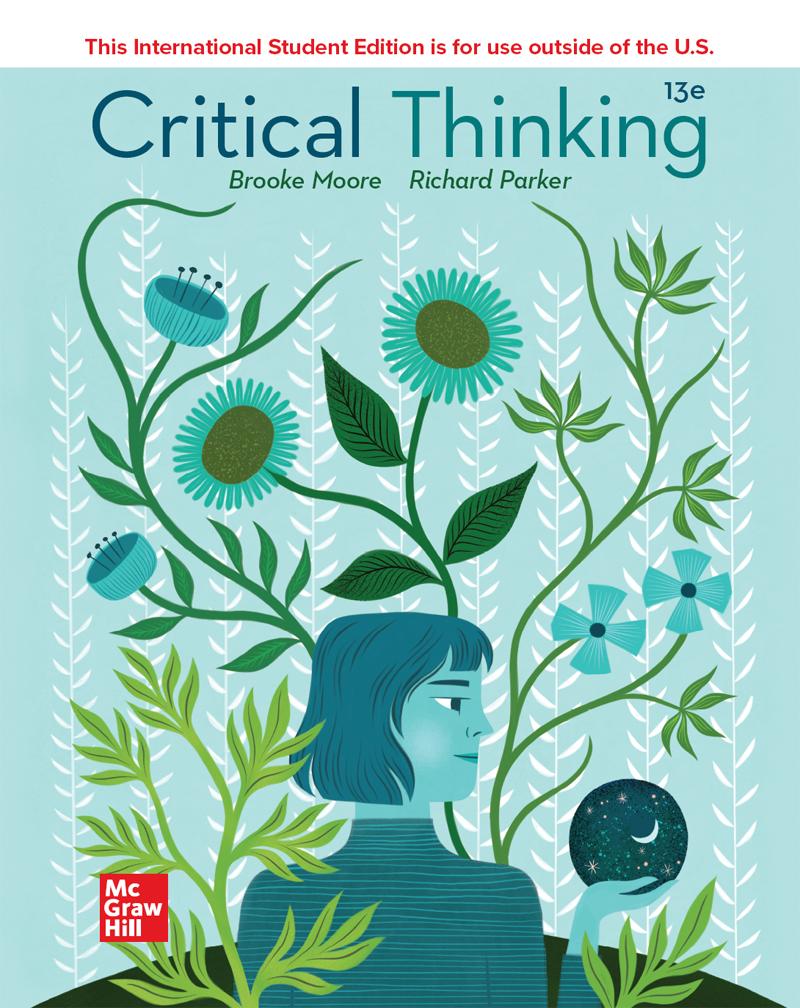

Most ebook files are in PDF format, so you can easily read them using various software such as Foxit Reader or directly on the Google Chrome browser.
Some ebook files are released by publishers in other formats such as .awz, .mobi, .epub, .fb2, etc. You may need to install specific software to read these formats on mobile/PC, such as Calibre.
Please read the tutorial at this link: https://ebookbell.com/faq
We offer FREE conversion to the popular formats you request; however, this may take some time. Therefore, right after payment, please email us, and we will try to provide the service as quickly as possible.
For some exceptional file formats or broken links (if any), please refrain from opening any disputes. Instead, email us first, and we will try to assist within a maximum of 6 hours.
EbookBell Team

4.0
6 reviews
ISBN 10: 1266808868
ISBN 13: 9781266808869
Author: Brooke Noel Moore
Critical Thinking is not about critical thinking as much as it is a text in critical thinking. It provides guided practice through hundreds of exercises and examples, to help students apply content and think critically themselves. With an enjoyable, concise reading style and a visually clear layout, Critical Thinking trains students to improve information acquisition skills, recognize dubious claims, and hone critically important skills. The authors’ expanded coverage on how to recognize dubious claims is gravely applicable in the current climate of fake news, deep fakes, and AI-created information. The authors provide guided practice in what instructors say are the most important critical thinking skill sets for students.
Introduction to Critical Thinking
What Is Critical Thinking?
Critical Thinking Standards
The Benefits of Critical Thinking
Barriers to Critical Thinking
Characteristics of a Critical Thinker
Recognizing Arguments
What Is an Argument?
Identifying Premises and Conclusions
What Is Not an Argument?
Reports
Unsupported Assertions
Conditional Statements
Illustrations
Explanations
Basic Logical Concepts
Deduction and Induction
How Can We Tell Whether an Argument Is Deductive or Inductive?
The Indicator Word Test
The Strict Necessity Test
The Common Pattern Test
The Principle of Charity Test
Exceptions to the Strict Necessity Test
Language
Ambiguity
Vagueness
Definitions
The Power of Language
Logical Fallacies—Part I
Fallacies of Relevance
Ad Hominem
Appeal to Authority
Appeal to Popularity
Appeal to Emotion
Red Herring
Straw Man
False Dilemma
Slippery Slope
Logical Fallacies—Part II
Fallacies of Weak Induction
Hasty Generalization
False Cause
Weak Analogy
Fallacies of Presumption
Begging the Question
Complex Question
False Dichotomy
Suppressed Evidence
Fallacies of Ambiguity
Equivocation
Amphiboly
Analyzing Arguments
Argument Forms
Standard Form
Argument Diagrams
Evaluating Arguments
Evaluating Arguments and Truth Claims
Assessing the Truth of Premises
Assessing the Strength of Arguments
Assessing the Truth of Conclusions
Assessing the Credibility of Sources
A Little Categorical Logic
Categorical Propositions
Venn Diagrams
Syllogisms
Validity and Soundness
A Little Propositional Logic
Propositions and Connectives
Truth Tables
Conditional Statements
Rules of Inference
Inductive Reasoning
Inductive Generalizations
Analogies
Causal Inferences
Statistical Reasoning
Finding, Evaluating, and Using Sources
Types of Sources
Evaluating Sources
Using Sources Ethically
Writing Argumentative Essays
Planning and Organizing
Drafting and Revising
Citing Sources
Avoiding Plagiarism
wiley ebook access
1-1 assignment critical thinking for business decisions
critical thinking book 1 pdf
the internet book of critical care pdf
thinking critically about ethical issues 10th edition pdf
thinking critically about ethical issues pdf free
Tags: Brooke Noel Moore, Critical, Thinking